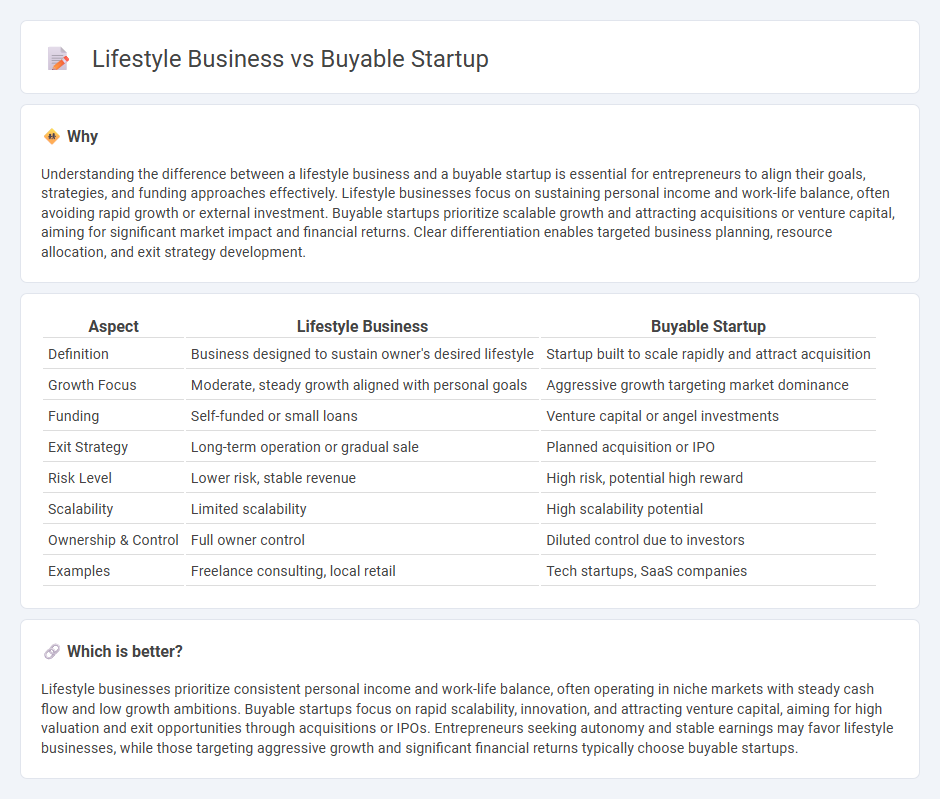
Lifestyle businesses prioritize sustainable income and personal freedom, focusing on steady growth and work-life balance. Buyable startups target rapid scalability and market disruption, aiming to attract significant investment and acquisition interest. Explore the key distinctions to determine which entrepreneurial path aligns with your goals.
Why it is important
Understanding the difference between a lifestyle business and a buyable startup is essential for entrepreneurs to align their goals, strategies, and funding approaches effectively. Lifestyle businesses focus on sustaining personal income and work-life balance, often avoiding rapid growth or external investment. Buyable startups prioritize scalable growth and attracting acquisitions or venture capital, aiming for significant market impact and financial returns. Clear differentiation enables targeted business planning, resource allocation, and exit strategy development.
Comparison Table
| Aspect | Lifestyle Business | Buyable Startup |
|---|---|---|
| Definition | Business designed to sustain owner's desired lifestyle | Startup built to scale rapidly and attract acquisition |
| Growth Focus | Moderate, steady growth aligned with personal goals | Aggressive growth targeting market dominance |
| Funding | Self-funded or small loans | Venture capital or angel investments |
| Exit Strategy | Long-term operation or gradual sale | Planned acquisition or IPO |
| Risk Level | Lower risk, stable revenue | High risk, potential high reward |
| Scalability | Limited scalability | High scalability potential |
| Ownership & Control | Full owner control | Diluted control due to investors |
| Examples | Freelance consulting, local retail | Tech startups, SaaS companies |
Which is better?
Lifestyle businesses prioritize consistent personal income and work-life balance, often operating in niche markets with steady cash flow and low growth ambitions. Buyable startups focus on rapid scalability, innovation, and attracting venture capital, aiming for high valuation and exit opportunities through acquisitions or IPOs. Entrepreneurs seeking autonomy and stable earnings may favor lifestyle businesses, while those targeting aggressive growth and significant financial returns typically choose buyable startups.
Connection
Lifestyle businesses and buyable startups connect through their shared focus on creator control and market adaptability, but they diverge in growth ambitions and exit strategies. Lifestyle businesses prioritize sustainability and owner lifestyle over rapid scale, while buyable startups aim for quick expansion and acquisition potential to maximize investor returns. The entrepreneurial journey often transitions from lifestyle stability toward scalable, exit-oriented ventures to balance personal goals with market opportunities.
Key Terms
Scalability
Buyable startups prioritize rapid scalability through innovative technology and aggressive market expansion, attracting venture capital and aiming for high valuations and exit opportunities. Lifestyle businesses focus on steady, manageable growth tailored to sustain the owner's personal income and work-life balance, often avoiding external funding and large-scale scaling efforts. Explore the key factors that differentiate these business models and how scalability influences their success.
Exit Strategy
A buyable startup is designed with rapid growth and scalability to attract acquisition or public offering, emphasizing a clear exit strategy for investors and founders. In contrast, a lifestyle business prioritizes steady income and personal freedom, often lacking a defined exit path or high growth expectations. Explore detailed strategies to align your business model with your long-term exit goals.
Personal Autonomy
Buyable startups emphasize rapid growth and scalability to attract acquisition, often requiring founders to sacrifice personal autonomy for investor demands and operational demands. Lifestyle businesses prioritize personal autonomy by maintaining manageable growth and aligning business activities with the owner's lifestyle and values, enabling flexibility and work-life balance. Explore the key differences in decision-making and autonomy between buyable startups and lifestyle businesses to determine the best fit for your entrepreneurial goals.
Source and External Links
The ultimate guide to startup types - Buyable startups are created with the specific goal of being sold to larger companies, popular in tech, ideal for serial entrepreneurs or those seeing huge growth potential but not wanting long-term commitment.
Different Types of Startups and Their Examples - Buyable startups, mainly in technology and software, are designed to be acquired by bigger companies later, requiring strategic planning and unique innovation to attract buyers.
Know Your Startup: The 6 Different Types of Startups - Buyable startups focus on niche tech or software solutions with the intent to be acquired by large firms, contrasting with scalable startups that seek rapid growth funded by venture capital.
 dowidth.com
dowidth.com